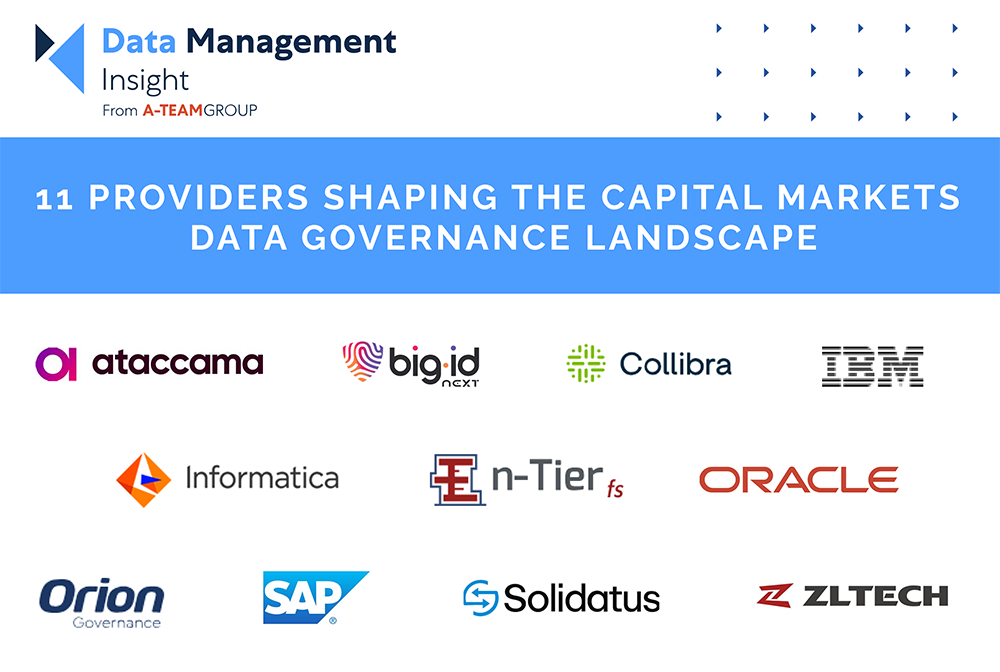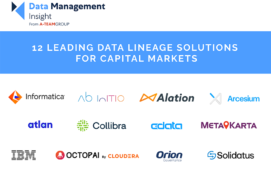
The vast volumes of data that capital markets participants are ingesting as a matter of necessity have placed new demands on their data estates. At a time of market volatility, increased regulatory scrutiny and growing requirements for real-time insights, keeping control of how their data is ingested, distributed and utilised has become a growing challenge. And when fragmented technology stacks are thrown into the mix, the difficulties mount. It’s a situation that argues for a robust, scalable governance framework, rather than a series of patches to plug holes created by changing needs. This article profiles a selection of leading vendors offering innovative solutions that address this core challenge.
IBM offers a broad portfolio of data and AI governance solutions, including the IBM Cloud Pak for Data platform, which provides a comprehensive suite of data management tools and enables financial institutions to manage the increasing complexity of their hybrid cloud and AI environments. It also offers data lineage services that it assumed with the incorporation of Manta. IBM’s deep enterprise-scale capabilities and its focus on an integrated AI and data governance strategy. Its solutions are designed to not only manage data but also to govern the entire lifecycle of AI models, from development to deployment. By providing a unified platform, IBM seeks to ensure that data used for AI is governed, trustworthy and compliant, mitigating the risk of biased or non-compliant models.Informatica offers an enterprise-grade data management cloud that includes a wide range of services, with a strong emphasis on data governance, data quality and data lineage. Its solutions are designed to tackle the problem of managing and governing data across complex, multi-cloud and hybrid environments. Informatica’s AI-powered engine, CLAIRE, automates metadata management and provides intelligent recommendations, enabling organisations to understand and govern their data at scale. The end-to-end data integration and governance platform has been engineered to provide the tools to connect, integrate and govern data from any source, ensuring consistency and accuracy.
Ataccama provides a unified, AI-powered data management platform that integrates data quality, master data management and data governance processes. The Ataccama ONE platform automates and consolidates data management capabilities into a single, self-service platform. It uses machine learning to automate tasks like data classification and quality rule creation, reducing manual effort and accelerating time to value. Its single, integrated environment eliminates the operational silos between data quality, MDM and governance teams, ensuring a consistent and trusted view of data across the enterprise.
BigID specialises in data discovery and intelligence with a focus on identifying, classifying and protecting sensitive data across an organisation’s entire data estate. Its approach is centred on deep data discovery, harnessing metadata and more to profile and classify data at the element level. This aids regulatory compliance and privacy processes by enabling firms to understand where sensitive information resides. Consequently, financial institutions can enforce policies, manage access controls and respond to data subject requests with confidence.
Collibra offers a comprehensive data governance platform that serves as a system of engagement for all data stakeholders, from business users to data stewards and IT professionals. The company stresses its business-focused data catalogue and governance framework, stating it provides a collaborative environment for defining and managing business glossaries, data lineage and data policies, making data more accessible and understandable for non-technical users. Collibra seeks to resolve the communication gap between business and IT by creating a centralised, collaborative space for data knowledge, and in so doing, democratises data access and ensures a shared understanding of data assets, fostering a data-driven culture and improving decision-making.
n-Tier’s rules-based, configurable regulatory reporting and data governance platform is tailored for capital markets participants to solve the specific challenge of navigating complex and evolving financial regulations. The platform is designed to handle complex rules and reporting requirements (eg, MiFID II, EMIR), by providing a robust framework for compliance.
Oracle’s data governance solutions are an integral part of its enterprise data management and cloud platforms, providing metadata management, data quality and security capabilities to ensure clients maintain consistency and control of their data estates. By leveraging its deep expertise in enterprise databases and its integrated cloud infrastructure, Oracle offers comprehensive governance solutions, providing a single-vendor ecosystem for data management, from the underlying database to the governance layer. The integration of governance into the core technology stack enables Oracle to reduce the complexity of managing data across different vendor solutions.
Orion Governance seeks to address the challenge of data ecosystem complexity and lack of visibility through its automated data lineage and metadata management platform. The platform automatically ingests metadata from a wide range of sources to provide a dynamic view of data flows, dependencies and business context. Its automated and holistic view of data lineage enables financial institutions to accelerate cloud migration projects, simplify M&A integrations and ensure regulatory compliance by understanding the full lifecycle of their data.
SAP’s suite of data governance and master data management solutions, built primarily for organisations already using the SAP enterprise resource planning (ERP) ecosystem, aids clients in governing their business-critical data. Through integration with its own enterprise applications, its purpose-built solutions enable clients to govern the master data that drives SAP’s core business processes, ensuring consistency and accuracy across financials, supply chain, and other functions. SAP seeks to ensure that the data at the heart of clients’ operations is trusted and compliant, avoiding data inconsistencies that could disrupt business processes.
Solidatus’s data lineage and modelling platform provides a visual, collaborative, and detailed representation of data flows to help communicate complex data architectures to diverse stakeholders and streamline regulatory reporting, operational efficiency, and large-scale transformation projects. Teams can identify and understand data dependencies through capabilities such as the visualisation engine, which creates intuitive and interactive maps of data lineage.
ZL Technologies provides a unified data governance and information management platform that focusses on managing the entire data lifecycle, from creation to disposition. This integrated approach enables firms to manage all structured and unstructured data under one roof, eliminating the need for disparate point solutions. ZL Technologies’ capabilities address the challenges of data retention, legal discovery, and compliance in a world of ever-increasing data volumes. This ensures firms can defensibly manage data throughout its lifecycle, reducing storage costs and mitigating legal and regulatory risks.
- Come and meet IBM and Informatica face-to-face at the A-Team Group Data Management Summit in New York City on 18 September. Register your attendance here.
Subscribe to our newsletter




